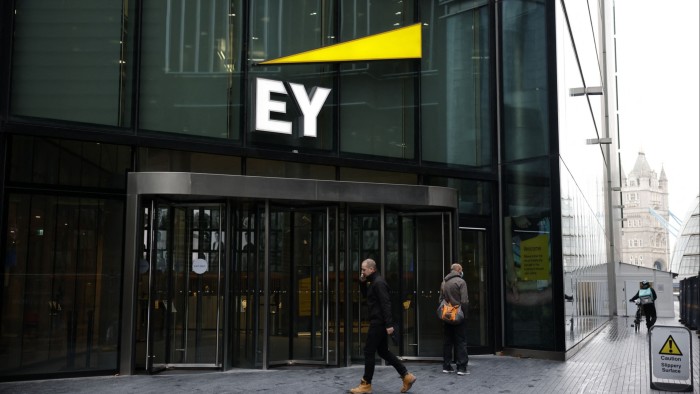Unlock the Editor’s Digest for free
Roula Khalaf, Editor of the FT, selects her favourite stories in this weekly newsletter.
EY has been accused of helping a United Arab Emirates oil storage business carry out a fraud against investors in a US special acquisition company, the latest lawsuit to hit the accountancy firm about an audit of a fraudulent company.
In a lawsuit filed in the Southern District of New York last week, a group of Brooge Energy shareholders accused EY of having a “pivotal role in a years’ long scheme” to help the Fujairah-based company defraud investors in a 2019 Spac transaction.
The oil storage operator listed its shares on Nasdaq that year through a merger with a Spac that gave it a market valuation of more than $1bn, making it an early beneficiary of a renewed wave of investor enthusiasm for companies publicly listing their shares using a method with lighter-touch regulation.
But despite having the backing of powerful Middle East investors including Sheikh Mohammed bin Khalifa bin Zayed Al Nahyan, the son of the previous president of the UAE, Brooge’s shares have since collapsed 99 per cent after US authorities uncovered a long-running fraudulent scheme at the company.
The lawsuit from Brooge shareholders — which is against EY Middle East, its UAE office’s managing partner Anthony O’Sullivan and several other EY member firms — accuses the audit firm of not only failing to spot clear indications of fraud, but also playing a “key role” in a “round-tripping scheme” to mask falsified revenues.
The US lawsuit comes after administrators of collapsed UAE hospital administrator NMC Health brought a $2.7bn legal claim against EY for allegedly failing to take basic steps that could have helped identify fraudulent transactions. EY is also facing litigation from shareholders in Wirecard, the German payments company that collapsed after the FT exposed it was a long-running fraud.
“This is an astonishing story of brazen, long-running, egregious fraud by one of the only four UAE companies listed on Nasdaq or the NYSE,” Neil Richardson, one of the investors who filed the lawsuit, told the Financial Times, adding that it was vital for investors to be made whole so “quality” companies from the region can “access the US capital markets going forward”.
EY said that it “emphatically” rejected the claim filed against it.
“Responsibility for this fraud lies with Brooge Energy’s principal shareholders and senior officers and claims against EY for damages are unfounded. We cannot comment further ahead of legal proceedings,” EY added.
The US Securities and Exchange Commission announced fraud charges against Brooge a year ago, alleging that the company had for years used “false invoices” to inflate revenues by as much as 80 per cent. Brooge agreed to settle the SEC’s charges that found the company violated various federal securities laws.
EY issued an unqualified audit opinion for Brooge’s 2017 and 2018 accounts, during which time the company claimed it had contracts with two commodity trading firms. The lawsuit describes these contracts as a “sham” and alleges that through the period EY audited the company Brooge “never received a single payment from either customer”.
EY allegedly “failed to verify the authenticity” of invoices related to these contracts. In one instance, EY asked to see bank statements to confirm if millions of dollars had been received from one of the trading firms, during which time the company had deposited cheques from an affiliated entity to cover up the missing revenue.
EY allegedly either “did not ask to see copies of the cheques to confirm the identity of the payer” or “accepted some explanation from Brooge” about the discrepancy.
The investors also allege that EY then assisted Brooge with a plan to transfer — or “novate” — the contracts from the trading firm to the affiliated entity, Al Brooge International Advisory (BIA), which the SEC last year said “had no meaningful business operations aside from participating in the misstatements of revenues” at the US-listed company.
“This novation structure was fraudulent because it allowed the EY Defendants to explain away the ‘revenues’ from BIA,” the lawsuit alleges.
The lawsuit also notes that EY signed off on Brooge’s 2019 accounts even after O’Sullivan and another EY manager attended an audit committee and reported that the auditor had “identified a fraud risk.”
The FT revealed in January that an executive from consulting firm Alvarez & Marsal — who had been appointed as a director of Brooge to aid in its restructuring — had been detained in the emirate of Fujairah while carrying out his work. He was later released and resigned as a director. A&M declined to comment.
The plaintiffs in the lawsuit against EY also allege that a UAE citizen called Husam Al Ameri exercised “de facto control over” Brooge, while noting that he was previously sanctioned by Dubai financial regulators for “executing a round-trip revenue generation fraud”.
Brooge and Al Ameri did not respond to requests for comment.



